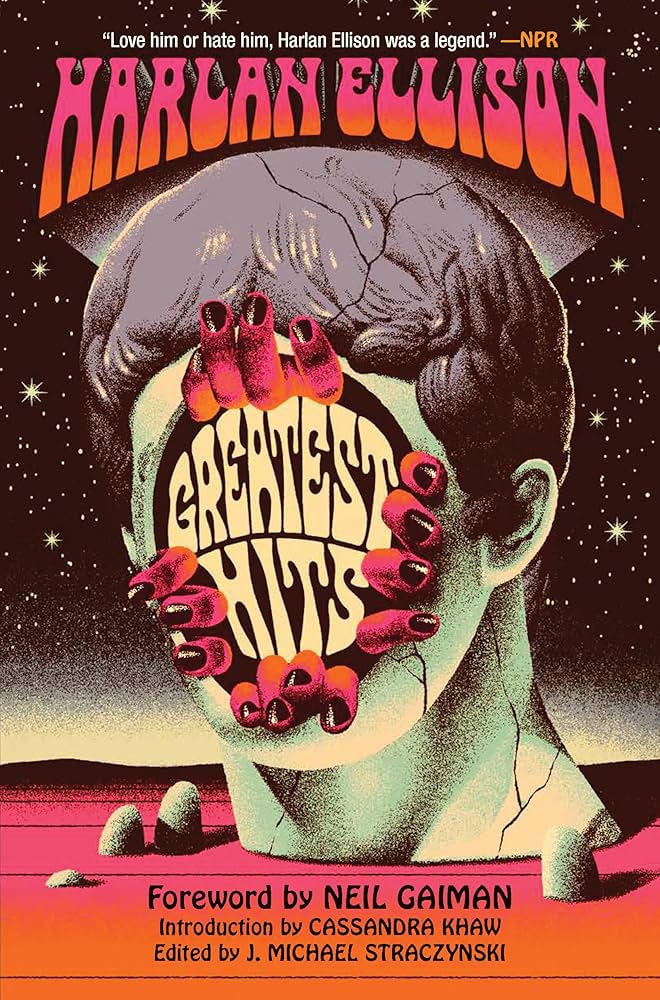The late Harlan Ellison was inarguably a giant of the sci-fi and fantasy worlds. And while his works tended to skew towards the fantastic, he was also simply an incredibly talented writer overall; his eight Hugo Awards, five Bram Stokers, four Nebulas and two Edgars attest to both of these facts. Even if you’ve never heard the name, you’ve certainly heard of his work: 1966 Hugo and Nebula winner “I Have No Mouth, and I Must Scream” is a household title even in the present day.
Ellison passed away in 2018, but thanks to his executor, colleague, and friend J. Michael Straczynski, “Greatest Hits” was published this year to highlight Ellison’s finest work as well as the stories he personally took the greatest pride in. But just how definitive is this definitive Ellison? How strong are Straczynski’s selections? Are these in fact the author’s “Greatest Hits”?
Ellison was a master of form, and this collection does a stellar job showcasing his creativity in that department. Stories like “Pretty Maggie Moneyeyes,” “Eidolons,” and “From A-Z, in the Chocolate Alphabet” play with readers’ expectations of not only the content of the prose but the prose itself. “The Deathbird” is maybe the best example here: it introduces itself as an exam – a multiple-choice exam! – giving the reader a specially immersed role in its epic narrative and creating an experience like nothing else I’ve read.
It’s often said that ideas are cheap, and the true measure of an author is the ability to blow up any idea into a full work. After reading “Greatest Hits,” I believe it. Ellison’s eye for detail and talent for creating unique narrative voices transform concepts like “meeting one’s doppelganger” or “the boy who doesn’t grow up” or “AI overlord” – pedestrian and overplayed to the modern reader – into multifaceted gems that have only been polished further by the passage of time. “Shatterday” is a quietly moving rumination on responsibility and growth; “Jeffty is Five” is an alternately nail-biting and tear-jerking tale of childhood wonder; “‘Repent, Harlequin,’ Said the Ticktock Man” is a wonderfully outlandish, if blunt, critique of capitalism and modern work culture; and suffice it to say “I Have No Mouth, and I Must Scream” is iconic for a whole host of reasons.
However, the inexorable march of time has also given us the collection’s one glaring misstep. The mystery and horror worlds must have been pretty barren in 1973 for the Edgar, the genre’s highest award, to be bestowed upon “The Whimper of Whipped Dogs.” Ellison’s fictionalization of the notorious Kitty Genovese murder is rather difficult to take at face value when one has the modern knowledge that the witnesses’ alleged deadly apathy was a media fabrication. Even in a vacuum, though, the story falls flat. “Whipped Dogs” is gruesome without the redeeming scope and creative vision of “I Have No Mouth,” pessimistic without the redeeming bittersweetness of “Jeffty is Five,” cynical without the redeeming unique voice of “All the Lies That Are My Life,” and an attempt at social commentary that rings hollow compared to the timeless relevance of “‘Repent, Harlequin’” and “Mefisto in Onyx.”
While nothing else falls nearly as flat as “Whipped Dogs,” there are a couple other Hits that are perhaps less than Great. Ellison’s inventiveness was one of his greatest weapons, wielded to great effect throughout most of his corpus. However, there are a few cases where it turns out to be a double-edged sword. The shaggy-dog tale of extraterrestrial Judaism “I’m Looking for Kadak” indulges levels of detail that go beyond exhaustive into simply exhausting. Ellison famously viewed his work as a “holy chore” to write; “Kadak” is a regular old chore to read. And while it isn’t as soul-sucking as “Kadak,” “The Beast that Shouted Love at the Heart of the World” takes some serious effort to parse. I personally enjoyed it, but it dances on a very fine line between a mind-expanding puzzle box and an impenetrable rock of a story.
Circling back around to that commentary, no discussion of Ellison would be complete without mentioning his work as a social writer. Ellison was a card-carrying leftist who marched at Selma and railed against the Vietnam war, and “Greatest Hits” makes his dedication to social causes apparent. The collection opens strong with “‘Repent, Harlequin,’ Said the Ticktock Man” which is both a delight to read and an evergreen, if not subtle, indictment of societal obsession with maximizing the time spent at work. An elderly Ellison proved he hadn’t yet lost his game with 2010’s “How Interesting: A Tiny Man,” whose unique, dispassionate voice and oddball ending make for a read that is, like its titular character, interesting if not outstanding. But far and away the best of Ellison’s nakedly political works, and one of the best in the collection, is “Paladin of the Lost Hour.” “Paladin” is a powerful antiwar tale told with all the tenderness that Ellison – who at a 1969 sci-fi convention on Texas A&M’s military-majority campus called the school’s Corps of Cadets “America’s next generation of Nazis” – lacked in real life. Here, Ellison’s characterization is at its peak. Gaspar and Billy are eminently lifelike and unflinchingly examined. The result is a profoundly moving portrait of trauma, friendship, and legacy.
“Greatest Hits” concludes with “All the Lies That Are My Life.” This story is a bit of an outlier. The through-and-through realism and candid, stream-of-consciousness-adjacent narration stand out in an otherwise fantastical and composed collection. “All the Lies” follows a writer who attends the will-reading of his far more talented and popular friend and colleague, and it seethes with a raw fury that is unlike the rest of “Greatest Hits” but very much reminiscent of the real-life Ellison. Without spoiling the ending, its inclusion in and conclusion of a posthumous collection feels like one last jab from the author and a moment of wry self-awareness from Straczynski. Even in death, Ellison seems to say, we’ll never be totally free of him. And after reading “Greatest Hits”? I don’t think I’d want to. 5/5.




